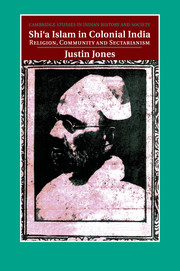Book contents
- Frontmatter
- Contents
- Figures and maps
- Preface and acknowledgements
- Frequently used abbreviations
- Note on transliteration
- Select glossary of terms
- Introduction
- 1 Madrasas, mujtahids and missionaries
- 2 Mosques, majalis and Muharram
- 3 Anjumans, endowments and Indian Shi‘ism
- 4 Aligarh, jihad and pan-Islam
- 5 The tabarra agitation and Shi‘a–Sunni conflicts in late colonial India
- Conclusion and epilogue Shi‘ism and sectarianism in modern South Asia
- Appendix Select Shi‘a ‘ulama of colonial India
- Select bibliography
- Index
- References
5 - The tabarra agitation and Shi‘a–Sunni conflicts in late colonial India
Published online by Cambridge University Press: 05 November 2011
- Frontmatter
- Contents
- Figures and maps
- Preface and acknowledgements
- Frequently used abbreviations
- Note on transliteration
- Select glossary of terms
- Introduction
- 1 Madrasas, mujtahids and missionaries
- 2 Mosques, majalis and Muharram
- 3 Anjumans, endowments and Indian Shi‘ism
- 4 Aligarh, jihad and pan-Islam
- 5 The tabarra agitation and Shi‘a–Sunni conflicts in late colonial India
- Conclusion and epilogue Shi‘ism and sectarianism in modern South Asia
- Appendix Select Shi‘a ‘ulama of colonial India
- Select bibliography
- Index
- References
Summary
Earlier chapters of this book have hinted at the growth of increasingly frequent and standardized manifestations of Shi‘a–Sunni conflict in colonial India, taking place around cultures of written and spoken religious polemic, the renovation of religious rituals and custom, discourses of community formation which emphasized their separateness and, later, the systematization of political differences. However, these developments only partially foreshadow the momentous disputes of the 1930s, a decade which saw a series of agitations by both communities in alleged defence of their religious rights. The culmination of these events was the tabarra agitation of 1939, when some 18,000 Shi‘as were jailed over a matter of months in Lucknow for the organized and collective recitation of the long-banned curses cast upon the early Caliphs. Accompanied by tense negotiations and several serious riots, the event remains perhaps the most significant instance of sectarian conflict in colonial or post-colonial India to date.
Unlike many of the subjects addressed in earlier chapters of this book, several analyses of these sectarian rows in 1930s Lucknow already exist. Most of these discussions, it will be shown here, have situated them within the wider ‘communalization’ of Indian society and politics in the 1920s–1930s, and ascendant social, economic and political developments which are identified as having tarnished Shi‘a–Sunni relations. Contrasting with these approaches, the main aim of this chapter is to locate their origins within a context of enhanced differentiation not merely between, but also within, Shi‘a and Sunni denominations. This will involve an interrogation of Shi‘a–Sunni sectarianism through the lens of change in leadership, participation and practice internal to these communities themselves – of course with the focus here primarily being on the Shi‘a – and to explore the interactions between apparently Shi‘a–Sunni conflicts and inner-Shi‘a contestation.
- Type
- Chapter
- Information
- Shi'a Islam in Colonial IndiaReligion, Community and Sectarianism, pp. 186 - 221Publisher: Cambridge University PressPrint publication year: 2011
References
- 1
- Cited by



